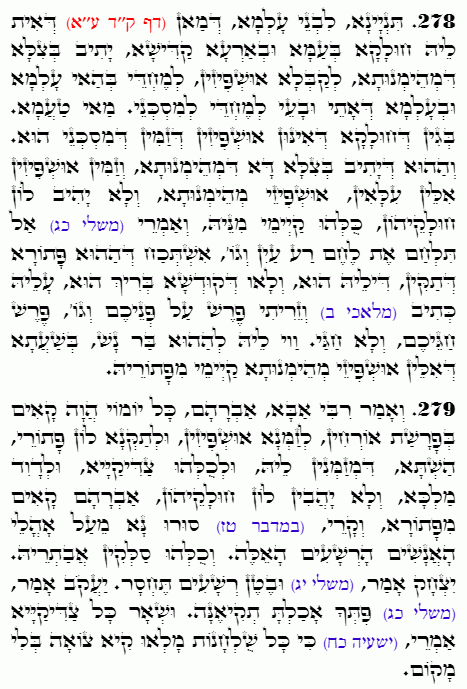Daily Zohar # 4562 – Emor – Don’t forget the guests!
Daily Zohar 4562

Hebrew translation:
279. וְאָמַר רַבִּי אַבָּא, אַבְרָהָם, כָּל יָמָיו הָיָה עוֹמֵד בְּפָרָשַׁת דְּרָכִים לְזַמֵּן אוֹרְחִים וּלְסַדֵּר לָהֶם שֻׁלְחָנוֹת. עַכְשָׁו שֶׁמַּזְמִינִים אוֹתוֹ וְאֶת כָּל הַצַּדִּיקִים וְאֶת דָּוִד הַמֶּלֶךְ וְאֵין נוֹתְנִים לָהֶם אֶת חֶלְקָם, אַבְרָהָם עוֹמֵד מֵהַשֻּׁלְחָן וְקוֹרֵא: (במדבר טז) סוּרוּ נָא מֵעַל אָהֳלֵי הָאֲנָשִׁים הָרְשָׁעִים הָאֵלֶּה. וְכֻלָּם עוֹלִים אַחֲרָיו. יִצְחָק אָמַר, (משלי יג) וּבֶטֶן רְשָׁעִים תֶּחְסָר. יַעֲקֹב אָמַר, (שם כג) פִּתְּךָ אָכַלְתָּ תְקִיאֶנָּה. וּשְׁאָר כָּל הַצַּדִּיקִים אוֹמְרִים, (ישעיה כח) כִּי כָּל שֻׁלְחָנוֹת מָלְאוּ קִיא צֹאָה בְּלִי מָקוֹם.
.
Zohar Emor
Continued from previous DZ
#278
The second instance where the scripture says “ישבו” (they shall dwell), using a more hidden or indirect language, is directed at the people of the world. This means that those who have a part among the people and in the Holy Land dwell in the shade of faith to receive the guests, to rejoice in this world and the next. It is necessary to bring joy to the poor. The reason for this is because the portion of the guests whom one has invited to his meal belongs to the poor. And he who dwells in this shade of faith, inviting these supreme guests of faith (Ushpizin), and does not give them their portion of the meal, namely to the poor, all the guests stand against him, and say,
Proverbs 23:6
“אַל תִּלְחַם אֶת לֶחֶם רַע עָיִן וְאַל תִּתְאָיו לְמַטְעַמֹּתָיו”
“Do not eat the bread of a miser, Nor desire his delicacies;”
It turns out that this table he has set is his own, of the stingy man, and it is not of the Holy One, Blessed be He, about whom it is written,
Malachi 2:3
“הִנְנִי גֹעֵר לָכֶם אֶת הַזֶּרַע וְזֵרִיתִי פֶרֶשׁ עַל פְּנֵיכֶם פֶּרֶשׁ חַגֵּיכֶם וְנָשָׂא אֶתְכֶם אֵלָיו”
“Behold, I will rebuke your descendants And spread refuse on your faces, The refuse of your solemn feasts, And one will take you away with it.”
Your festivals become profane, and not My festivals. Woe to that person at the time when these guests of faith stand away from his table.
Lesson;
This Zohar teaching emphasizes the ethical and communal responsibilities entwined with the spiritual practices of Sukkot. The sukkah is not just a place for personal spiritual elevation but also for exercising generosity and inclusivity, especially towards the poor and needy. Failing to honor this broader social obligation results in a profound spiritual loss, where even the divine guests, representing the Light of the Seven Sefirot, withdraw their presence. This intertwines the joy of Sukkot with acts of charity, suggesting that the true celebration of Hashem’s blessings is incomplete without extending those blessings to the less fortunate.
When we don’t have actual poor people to invite, we give to channels of Light because the Light brings sustenance and blessings to all.
#279
Rabbi Abba said, Abraham, who all his days stood at the crossroads to invite guests and set a table for them. Now, during Sukkot, if we invite him along with all the other Tzadikim, including King David, and do not give them their due share, Abraham would stand up from the table and declare,
Numbers 16:26
“וַיְדַבֵּר אֶל הָעֵדָה לֵאמֹר סוּרוּ נָא מֵעַל אָהֳלֵי הָאֲנָשִׁים הָרְשָׁעִים הָאֵלֶּה וְאַל תִּגְּעוּ בְּכָל אֲשֶׁר לָהֶם פֶּן תִּסָּפוּ בְּכָל חַטֹּאתָם”
“And he spoke to the congregation, saying, “Depart now from the tents of these wicked men! Touch nothing of theirs, lest you be consumed in all their sins.”
And all the Ushpizin, the Light of the seven sefirot, would withdraw after Abraham. Isaac would say,
Proverbs 13:25
“צַדִּיק אֹכֵל לְשֹׂבַע נַפְשׁוֹ וּבֶטֶן רְשָׁעִים תֶּחְסָר.”
“The righteous eats to the satisfying of his soul, But the stomach of the wicked shall be in want.”
Jacob would say,
Proverbs 23:8
“פִּתְּךָ אָכַלְתָּ תְקִיאֶנָּה וְשִׁחַתָּ דְּבָרֶיךָ הַנְּעִימִים”
“The bread you have eaten, you will vomit up, And waste your pleasant words.”
And the other Tzadikim, namely Moses and Aaron, would say,
Isaiah 28:8
“כִּי כָּל שֻׁלְחָנוֹת מָלְאוּ קִיא צֹאָה בְּלִי מָקוֹם”
“For all tables are full of vomit and filth; No place is clean.”
Lesson;
This vivid portrayal highlights the severe spiritual consequences of neglecting the needs of the poor during a time dedicated to hospitality and sharing. It reinforces the idea that the essence of Sukkot is not only about rejoicing in God’s blessings but also about extending those blessings through acts of kindness and charity. Failing to do so, especially when invoking the presence of Abraham and other patriarchs at one’s table, equates to betraying the spirit of the holiday and the principles they taught us. The Sukkah may become a place of judgment, reflecting the righteousness or shortcomings of those who dwell within it.
{||}

 Previous: Emor
Previous: Emor

